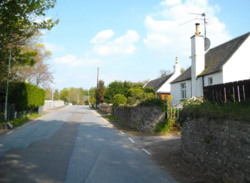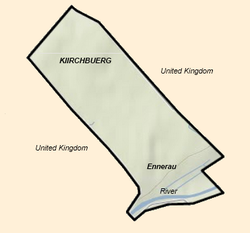Kirkburgh, Francisville
Burgh of Kirkburgh
Stadt Kiirchbuerg | |
|---|---|
Former District of Francisville | |
 Residential street in Kirkburgh, taken April 2011 | |
 Kirkburg within Wasserbrueck | |
| Country | |
| Canton | |
| Government | |
| • Type | Municipality (2008-2012) Burgh (2012-2014) |
| • Body | Kirkburgh Town Council |
| • Civic Leader | Mayor (2008-2012) Provost (2012-2014) |
| Area | |
| • Total | 0.31 km2 (0.12 sq mi) |
| Population (2014) | |
| • Total | 4 |
| Time zone | GMT |
| • Summer (DST) | BST |
| Languages | English, Francillian, French |
Kirkburgh (/kɜrkbəroʊ/; French: Kirkbourg /kɪrbuʁ/; Francillian: Kiirchbuerg /kiːrʒbuːərʤ/) was the largest town in Francisville and also served as the de facto capital of both the Democratic Duchy and the Federal Republic. Kirkburgh was a former municipality of the Duchy before later forming a burgh of the canton of Wasserbrueck.
History
In the Early Middle Ages, the region where the village is situated was settled by the Picts prior to the merger of the Pictish and Gaelic kingdoms under Cínaed mac Ailpín to form the basis for the early Kingdom of Alba. This is evidenced by pieces of pictish jewelry from around 800AD which have been found on the outskirts of the town. [1][2]
The site of the Battle of Culloden is located within the same historic parish approximately 11 km² (7 mi²) west of the village. The Jacobite army would have passed the boundaries of Kirkburgh on the night of 15 April 1746 as part of their failed attempt to attack the government forces camped near Nairn.[3] Prince Charles Edward Stuart was entertained by the local Clan Rose before the battle. This was followed by a visit by Prince William, Duke of Cumberland shortly after the Jacobite defeat. Tradition states that Baron Rose justified his impartial treatment of the two sides on the grounds of Highland hospitality despite his family’s Hanoverian sympathies[4]
The region was first claimed by the Duchy in January 2009. In April 2009, the territory of the Duchy was reconstituted to form the two smaller municipalities of Kirkburgh and Ennerau. During the June Convention, the constituent cantons of the Federal Republic were determined by a consultative referendum held on 13–16 January 2012. Kirkburgh retained its original boundaries and formed a county with burgh status in the canton of Wasserbrueck. In September 2012, local government reforms in Wasserbrueck estalbishing a unitary system of burghs. Kirkburgh remained the largest town in the Federal Republic serving de facto as the capital of both the canton and the federation.
Georgraphy
Kirkburgh extended over an area of approximately 0.31 km² (0.11 mi²). Its southern border neighboured the burgh of Ennerau whilst its other boundaries marked the Francillian land border with the United Kingdom. Kirkburgh was the principal residential settlement in Francisville. During the Ducal era, Kirkburgh contained the country's entire public infrustructure including the residence of the Grand Duke, the Chamber of Deputies, the National Archives, and all public transport links. The burgh contained a number of notable buildings:
- Kirkburgh House: Formerly the government headquarters of the Democratic Duchy, containing the Grand Ducal Residence, the National Archives, and the Assembly Hall. Latterly the capital building of Wasserbrueck, the office of the Provost of Kirkburgh, and the Kirkburgh public library.
- Holmewood House: Exclaved municipal headquarters of Ennerau, housing the office of the Mayor (later Provost) and the Ennerau public library.
- The Lodge - Woodlands. Former headquarters of the Ducal Defence Force.
Kirkburgh was home to a number of notable Francillian companies including The Francillian and d'Post.
Politics
Kirkburgh formed a municipality of the Democratic Duchy from April 2009 to August 2012. Municipal responsibilities included areas relevant to public works such as environmental protection, maintenance of footpaths, waste disposal, and foot-patrol policing. Kirkburgh was governed by a directly democratic town meeting which annually elected a mayor as the head of local government. Kikburgh became a burgh of Wasserbrueck from August 2012, after which is continued to be governed by the directly democratic Kirkburgh Town Council. The Town Council elected a provost as civic leader. Kirkburgh was governed by the following elected officials during its history:
- April 2009 - December 2009: Jeremy Abrahams (Mayor of Kirkburgh)
- December 2009 - August 2012: James Stewart (Mayor of Kirkburgh)
- August 2012 - November 2014: James Stewart (Provost of Kirkburgh)
Gallery
-
Village shop in Kirkburgh (August 1906)
-
Daffodils in Kirkburgh public park (April 2011)
-
Residential street in Kirkburgh (April 2011)
-
Holmewood House in the snow (November 2010)
See also
- Canton of Wasserbrueck
- Districts of Francisville
- Democratic Duchy of Francisville
- Federal Republic of Francisville
References
- ↑ "Silver brooch, a replica". scran.ac.uk. Retrieved 31 May 2018.
- ↑ "Fragment of a silver penannular brooch". scran.ac.uk. Retrieved 31 May 2018.
- ↑ Pittock, Murray (2016). Culloden: Great Battles. Oxford: OUP
- ↑ Cantlie, Hugh (1992). Ancestral Castles of Scotland. London: Collins & Brown.





